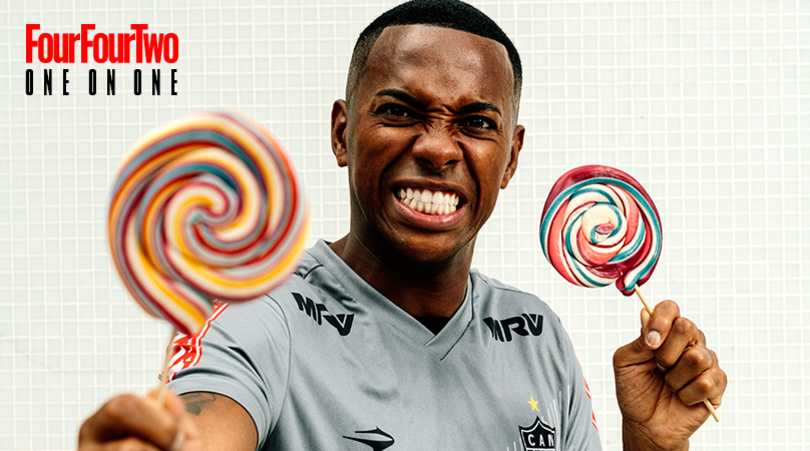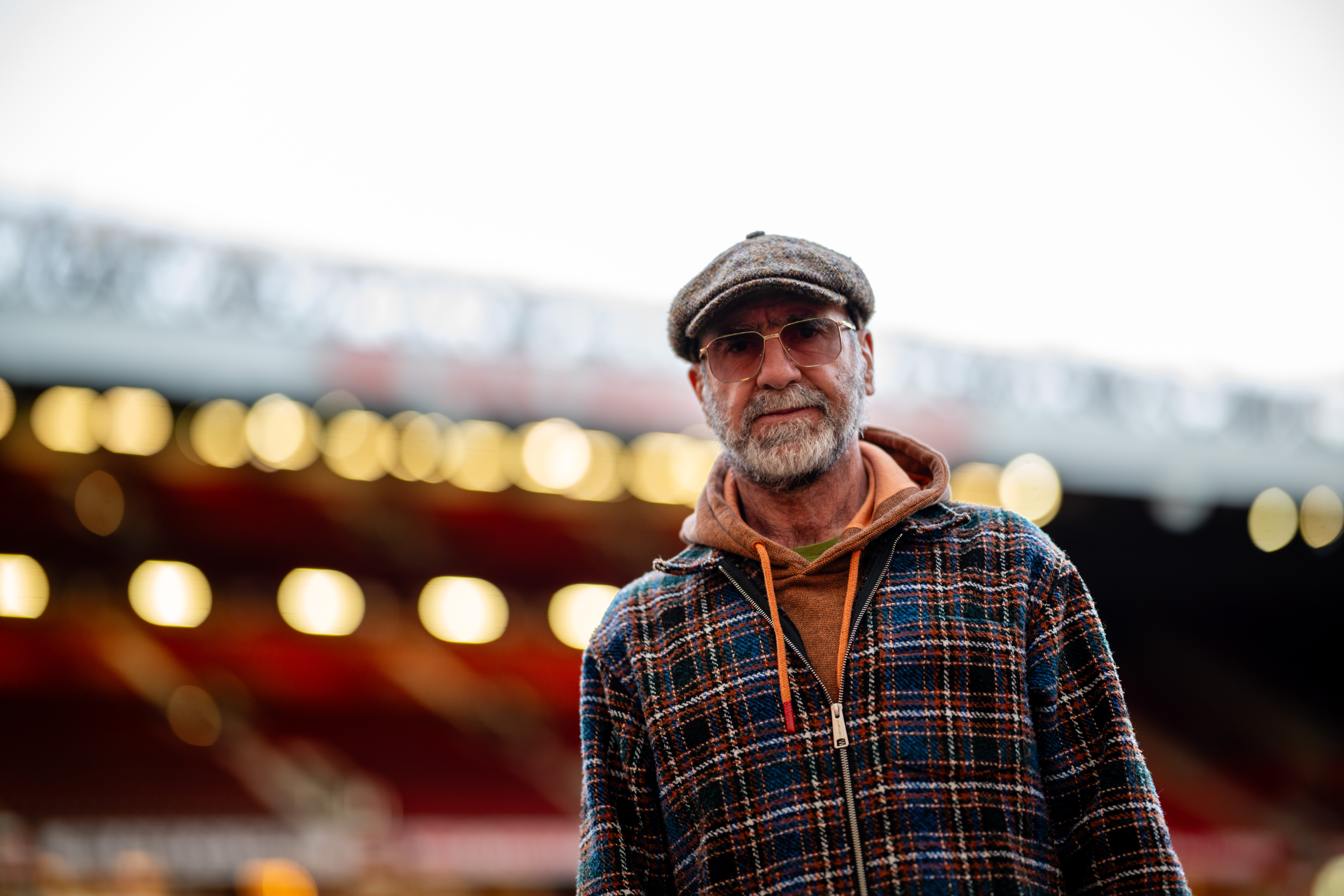Interview: Pablo Zabaleta on Oasis, missing Manchester’s rain and learning English from Corrie
Alec Fenn spoke to the departing Manchester City hero – who makes his Etihad Stadium farewell on Tuesday night – about rock gigs, local pubs and Sergio Aguero’s lazy language skills. Just don’t take him to Blackpool Illuminations...
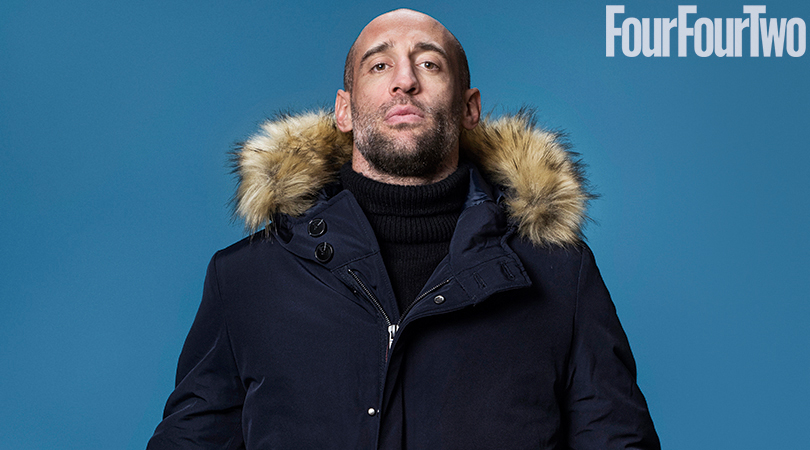
It’s 3pm inside Manchester City’s Etihad Campus and FFT is beginning to wonder whether we’ve been stood up. We have spent what seems like an absolute age gazing outside, as the rain falls from a mass of black clouds and bounces off the first-team squad’s fleet of expensive cars. Welcome to Manchester.
Slowly, the club’s flock of stars begin to emerge down a set of stairs leading to the main reception. David Silva comes shuffling along, clutching his designer washbag. A grinning Nolito then struts on through, his hair slicked back with a Spandau Ballet-sized serving of wet-look gel. However, there’s still no sign of our man.
Zabaleta looks like a cross between the Blues’ supremo Pep Guardiola and a nightclub bouncer
Our heart sinks as we take another nervous glance at our watch, when a rugged-looking figure with a closely shaven head and designer stubble appears at the top of the stairs. Wearing a black roll neck, grey jeans and some worn black trainers, he looks like a cross between the Blues’ supremo Pep Guardiola and a nightclub bouncer.
Pablo Zabaleta apologises for running slightly late – even though it’s not his fault. He’s a model of efficiency on and off the pitch, but has been held up after the day’s training session crept into the afternoon. “I’m so sorry – Thursday is always a very hard one,” he explains.
FFT is immediately struck by his accent, which is a blend of Argentinian and Mancunian. “I just think that I sound English,” he laughs. It’s nearly nine years since Zabaleta first set foot in this city. He’s since become a cult hero at the Etihad and an adopted Manc – we’re here to talk to him about how Manchester has become his second home. His local twang seems like a good place to start.
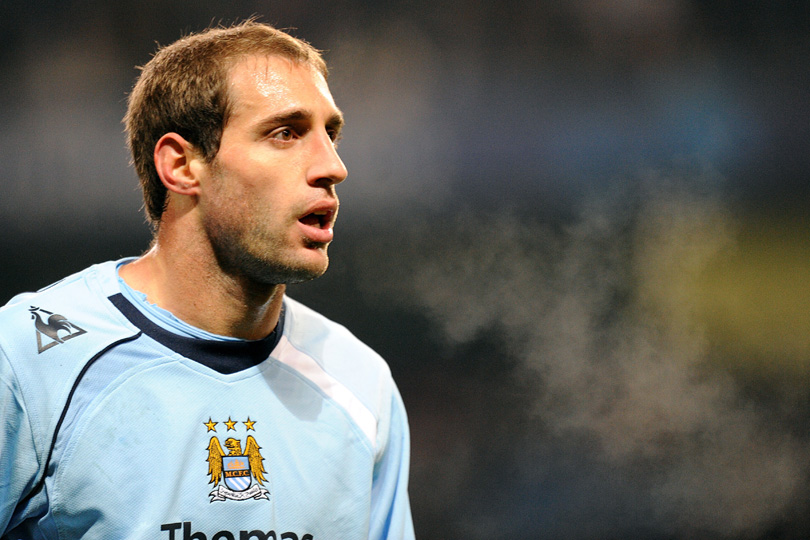
“It was very important for me to learn English as soon as I got here,” he says about his early days at the club. “Foreign players should make the effort when they move over to a new country. When I first arrived, Mark Hughes was the manager and 95% of the coaching staff were British. I had to learn quickly so I could be a real part of the club.”
The 32-year-old was one of four South Americans who met up once a week for a two-hour English lesson to aid their integration to life in England. Zabaleta was joined by Brazilian pair Robinho and Elano, as well as Ecuadorian striker Felipe Caicedo, on a row of desks inside an old classroom at the club’s former training ground.
Get FourFourTwo Newsletter
The best features, fun and footballing quizzes, straight to your inbox every week.
I didn’t have Spanish TV and my girlfriend was studying in Spain, so each day I would try to read English books and watch the TV
“I took English lessons at the club for one year; but after three lessons I started using a private teacher as well,” he says. “Sometimes there is a temptation to go home, have a shower and then just spend the rest of the day relaxing, but I wanted to use the time productively. I didn’t have Spanish TV and my girlfriend was studying in Spain, so each day I would try to read English books and watch the TV.
“The first thing that my teacher told me to do was to watch BBC News. Even in the car I was listening to BBC radio. I know it sounds boring, but the presenters talk at a slower pace, which helps you to pick up new words and phrases. I watched The X Factor and a few episodes of Coronation Street – but not too many!”
A translator and a trier
Zabaleta will often act as a translator for the Blues’ foreign imports, but he has little patience with those who don’t make enough effort. “Players often know a lot more English than people think, but they won’t talk in public as they’re afraid of saying something wrong and then making a mistake on camera in an interview.
There have been times when Kun [Sergio Aguero] asks someone how to say something and I just say, ‘Kun, don’t be lazy!
“Sometimes a player will need to say something and if I’m there they ask, ‘Zaba, how do I say this?’ and I say, ‘You’ve been here for five years, you should know that!’ There have been times when Kun [Sergio Aguero] asks someone how to say something and I just say, ‘Kun, don’t be lazy!’”
Sensing he’s on good form, FFT asks him to put on a long navy blue parka jacket and channel his inner Liam Gallagher for our snapper. He does so with relish and quickly works his way through a range of moody poses of which the former Oasis singer would be proud, while laughing at regular intervals. Something tells us he might have done this before.
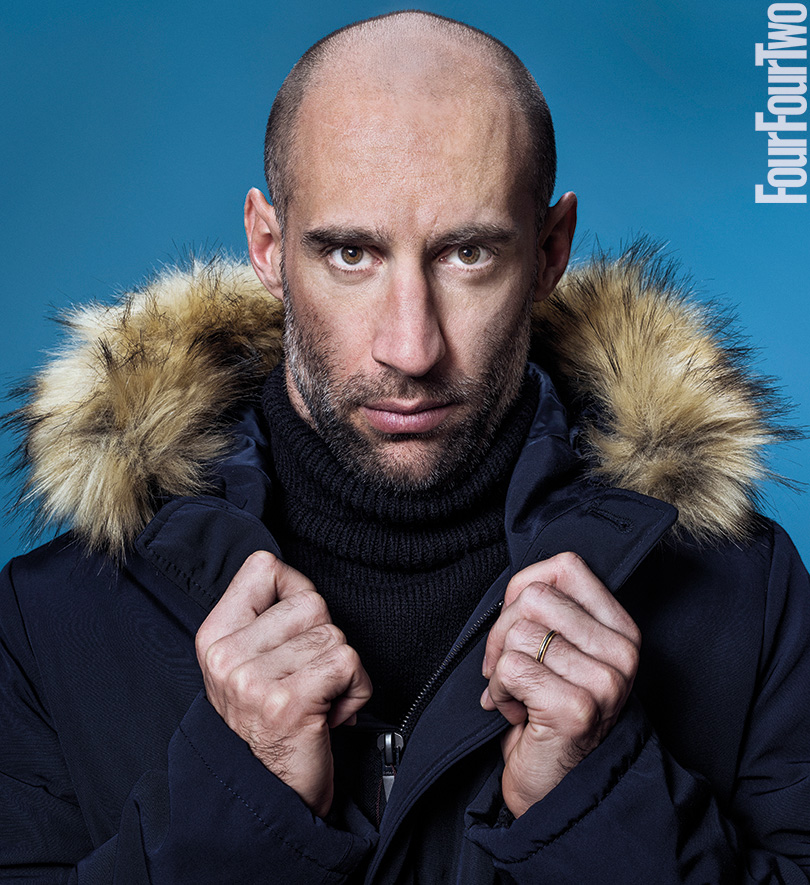
“Oasis are huge in Argentina, they have played a few gigs there,” he says. “Noel Gallagher’s solo music has done really well back home. I’ve met him in the dressing room a few times and Liam went to the party we had to celebrate winning the Premier League back in 2012. It’s great that we’ve got two rock and roll stars from the city supporting the club.”
At this point, we inform him of a video on YouTube, which shows Noel singing Zabaleta’s terrace chant – ‘Pablo Zabaleta, he is the f***ing man, he is an Argentinian, he’s harder than Jaap Stam.’ It’s the first time he’s heard of it but he looks pleased, which is unsurprising given his taste in music that mirrors Manchester’s musical identity.
There is no better place to watch that type of music than in England. The greatest bands come from this country – you can smell rock and roll in every city
“Argentina is a country that loves rock and roll music and I love it,” he adds. “There is no better place to watch that type of music than in England. The greatest bands come from this country – you can smell rock and roll in every city that you visit. That’s one of the reasons I love Manchester, because it’s a part of the culture here.
“Queen are probably my favourite band. When I was growing up, Freddie Mercury and Brian May were my idols – I loved their music. I like AC/DC and the Rolling Stones, too. Around a year or so ago I went to the Palace Theatre to watch Status Quo and was lucky enough to go and meet with them before the gig.
Zabaleta delivers a burst of the Quo
“I’m a big fan of bands who have been together for such a long time. I love that they still have that same passion to perform and make the same sort of music that they had when they were young. If I ever get any time off, then I love going to gigs.”
Like many of his favourite bands, the 32-year-old has become used to life on the road. Pablo Javier Zabaleta Girod was born on January 16, 1985 in Arrecifes, a small, sleepy town on the outskirts of Argentina’s capital, Buenos Aires, with a population of around 27,000.
Leaving home at 12
The eldest of four brothers, he packed his bags and left the family home at the age of 12 to join the academy of Primera Division side San Lorenzo. He lived in a village close to the club’s Pedro Bidegain stadium, which housed between 40 and 50 young boys who had come from outside of the city.
“I had to mature very quickly,” he reflects. “We had to clean senior players’ boots and do chores for them. I had no parents or family by my side and it was a different place where I was now surrounded by different people, but inside I knew that I had to follow my dream.
When you sign your first contract you see players who say, ‘I want to buy this flashy car or this watch’ but mentally you have stay focused on your football
“In life, at some point you have to make big decisions, and for me that happened at a young age. Today, I see youngsters who are 12 and 13 at Man City and I will think to myself, ‘Wow, I was so young when I made that decision to move away.’ Maybe it was crazy but it’s worked out pretty well.
“My decision-making skills got a lot better because I had more responsibilities. When you sign your first contract you see players who say, ‘I want to buy this flashy car or this watch’ but mentally you have stay focused on your football. I made decisions for myself from such a young age and that’s helped me to stay grounded during my career.”
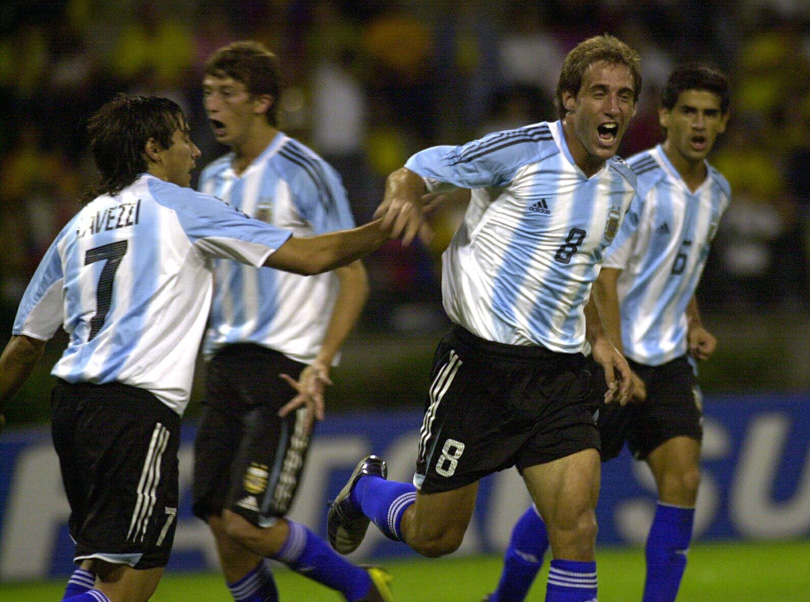
One of those big decisions was to leave his homeland and move to Europe in 2003 aged 19, four years after his mother passed away, when he signed for La Liga outfit Espanyol. Thirteen years have now passed since he was a resident of his native Argentina, but Manchester, he explains, provides him with a permanent reminder of home.
“There are definitely similarities between Argentinian and English people,” he says. “From my point of view, I can see that the two countries have the same passion for everything in terms of sport and going to watch football games. The passion of the people and the way that we all enjoy the game is the exact same for both.
“Whenever there’s a football match in Manchester, the whole weekend is built around the game for the people here. You will see fans enjoying themselves maybe two or three hours before the kick-off – it is a social occasion. People will drink before the match and then have a few pints after, too – it’s the same in Argentina.”
Look in at the local
Pubs - if not pints – offered an important escape in Pablo’s early days in Manchester. Zabaleta moved into the leafy suburb of Didsbury, an area popular with the city’s young professionals. It’s situated around 20 minutes away from the club’s Etihad Stadium and a safe enough distance to resist the temptations of the city centre.
I’d visit a fishmonger on the corner of my street two or three times every week, which was owned by a Man City supporter
“Didsbury was a great area to live,” he recalls. “It was close to our old training ground at Carrington and not far from Manchester Airport. And it’s near to the Trafford Centre too, which my girlfriend enjoyed when she flew over at weekends!
“I’d visit a fishmonger on the corner of my street two or three times every week, which was owned by a Man City supporter. There was also a pub across the road from my apartment called The Barleycorn. It’s a restaurant now, but back then it was a typical old-fashioned English pub. I would go in there most days to play pool and watch football on television. Me and my girlfriend had many happy times there.”
The girlfriend he frequently mentions in our chat became his wife in 2013. Zabaleta met Christel Castano – a journalist and model who spent a three-month spell working for the Manchester Evening News – during his time with Espanyol. The pair argued about tactics during their first date.
Aside from their love of football, they also share the same lust for adventure. After she had completed her journalism degree over in Barcelona, Christel joined him in Manchester on a permanent basis and they’ve continued their courtship by exploring every corner of the place they now call home.
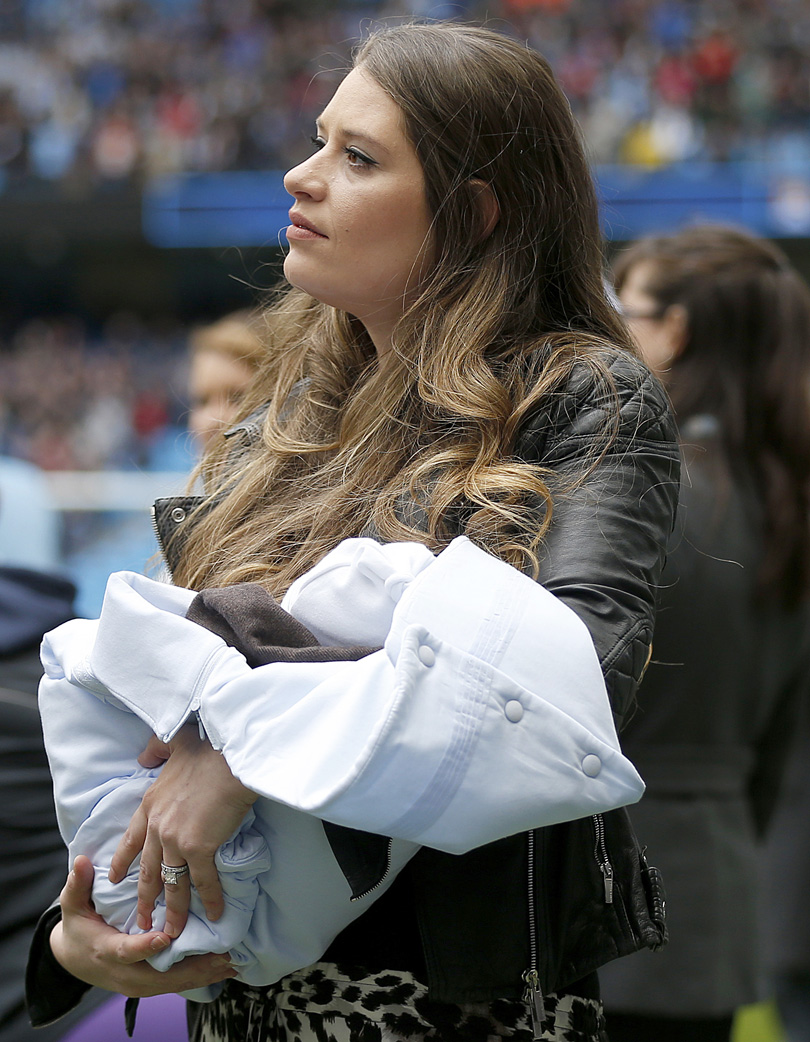
“When I first came here, I would always go to Barcelona to visit Christel if I had two or three days off,” he admits. “But after she had moved to Manchester we said to each other, ‘Let’s try something different’ – because there are so many beautiful places to visit in the UK.
“We love travelling around England. It was one of the things we used to do all the time when we first arrived here. We went to York, Chester, Liverpool, Bath, London, Edinburgh, Newcastle, Glasgow and the Lake District. We also went to Blackpool Illuminations once, but that was terrible!”
A quick scroll through Zabaleta’s Twitter feed also reveals a recent trip with Christel and their two-year-old son, Asier, to Tatton Park. The 1,000-acre Tudor estate has got a working farm in nearby Knutsford and attracts families from far and wide. He is also a regular at an Italian eatery called Rosanero in Macclesfield. “I’ve celebrated many happy moments there and become good friends with the owner.”
Soggy chips
However, he doesn’t pretend to love every aspect of life in England. “I’m not a huge fan of English food, but I will have fish and chips every few months.” FFT also wonders what he thinks of the 140 days of rainfall that descend on Manchester every year – a climate which over the years has seen a plethora of South American players leave the Premier League in search of warmer climes.
I love playing games in the rainy weather when the ball runs fast on the pitch
“I have to be honest, look at the weather outside – I can’t pretend I like this,” he says, gesturing at the gloomy skies through the nearest window. “But this place has definitely changed me. When I go on holiday to Spain for a month in the summer with the family, or somewhere with more sunshine, I find that I miss all the rain in Manchester. It sounds crazy, but it’s true.
“I’ve been here for many years now. In terms of playing football in another country, like Spain, and training in a hot climate – I think I’d find that very hard. I love playing games in the rainy weather when the ball runs fast on the pitch. It’s good.”
Zabaleta’s ability to adapt to change perhaps explains why he has succeeded where many other South Americans have failed to settle in Manchester. Two of his old English classmates – Robinho and Elano – lasted just two years. Alongside captain Vincent Kompany and current Torino loanee Joe Hart, he is one of only three survivors from the side that he first joined back in August 2008.
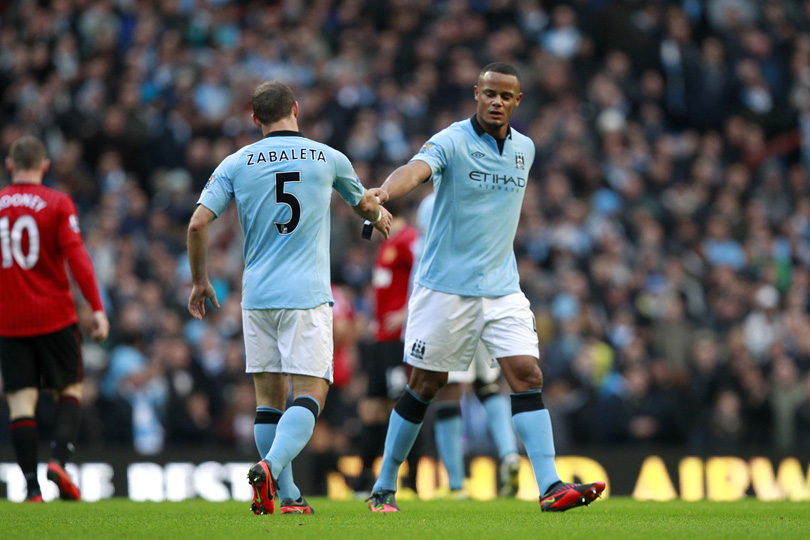
“My commitment and loyalty has been there on and off the pitch from day one – that’s why I think I have lasted,” he explains. “At the beginning everything is new and you have to adapt to a new style of football and life off the pitch, which isn’t easy. Sometimes you struggle a bit, but for me I’m happy to still be here.
It’s been a big challenge every year to prove that I’m good enough to be here as big money and big players come to the club
“The Premier League was always my dream. It’s absolutely amazing. I thought, ‘Let’s go to England’ – Manchester City was a different club to what it is today but it’s still the same in many ways. It’s been a big challenge every year to prove that I’m good enough to be here as big money and big players come to the club.”
His strength of personality and willingness to embrace local life have endeared him to the club’s supporters, who treat him with the same level of affection normally reserved for players born within the city.
‘Be yourself, but if you can be Pablo Zabaleta, then always be Pablo Zabaleta,’ is a common quote posted by fans on social media. It’s clear that the fans have rubbed off on him, too.
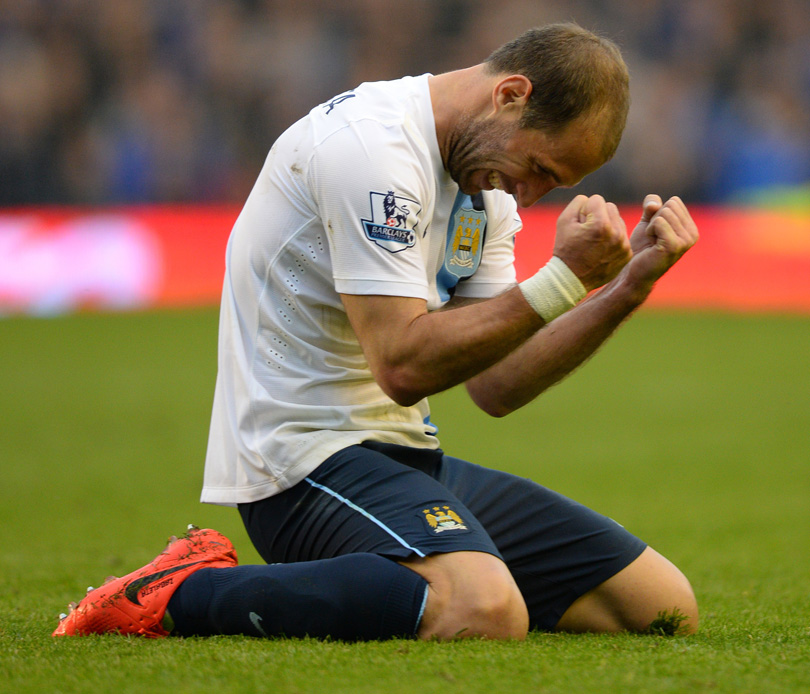
“Manchester City is the club that is in Manchester,” he says with the certainty of a season ticket holder supping a pint down his local pub, while debating the merits of the city’s dominant football teams.
“I remember when I first came here I stayed in the Hilton hotel for three weeks and I saw many City shirts in the street. Everyone told me Manchester United was the biggest club but I saw the City shirts everywhere and the supporters would always come up to me and remind me, ‘Remember, Manchester is blue!’”
At 32, the next chapter of his life isn’t far away and his thoughts have already turned to the future. Retiring to a house in Barcelona with his wife and child is one option. Returning to Argentina to be closer to his family and particularly his father, who was involved in a serious car accident in 2011, is another. But a tale about his son Asier suggests the traveller may now have found a new home.
“Asier was born at St Mary’s hospital, and so he is a proper Manc!” Zabaleta concludes. “We could have had the birth in the sunshine somewhere, maybe in Spain or somewhere closer to family and friends, but we thought, ‘We have built so much here and lived in England for such a long time, let’s have the birth right here.’ I think that showed the love that I’ve got for this city.”
The city – well, the blue half – loves him back.
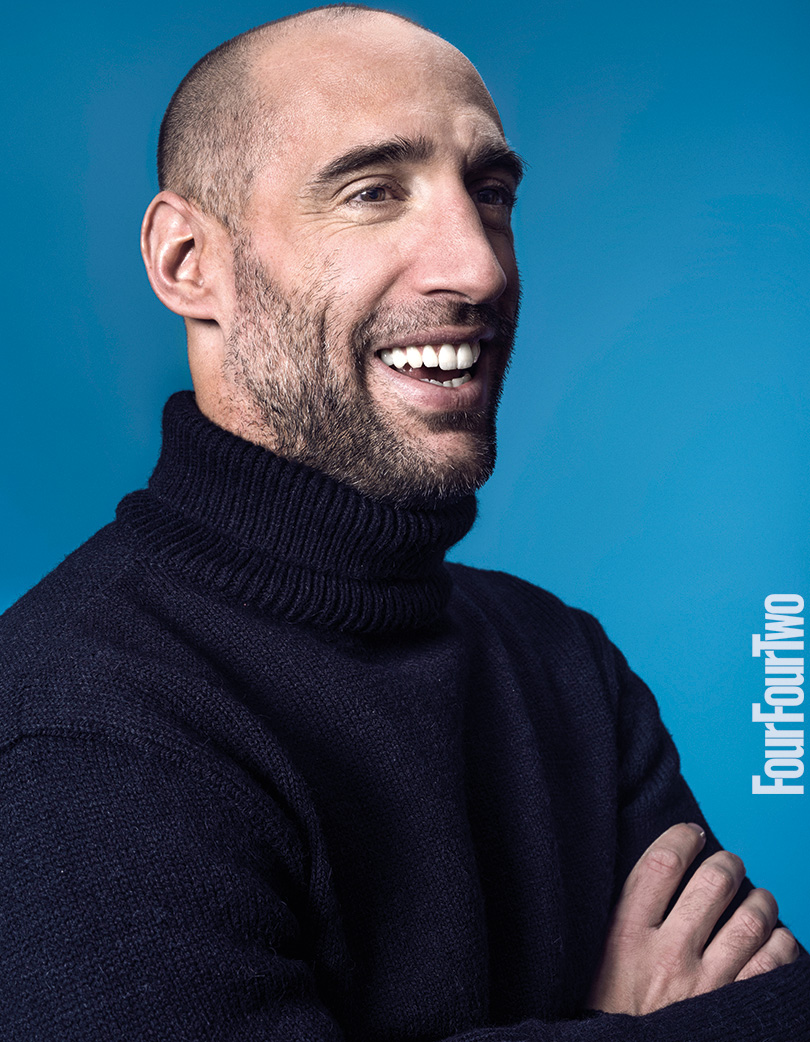
This feature originally appeared in the March 2017 issue of FourFourTwo. Subcribe!
